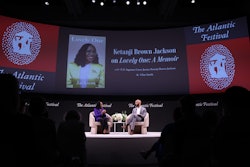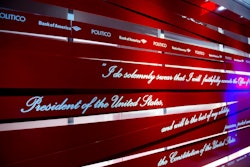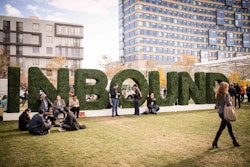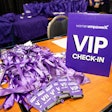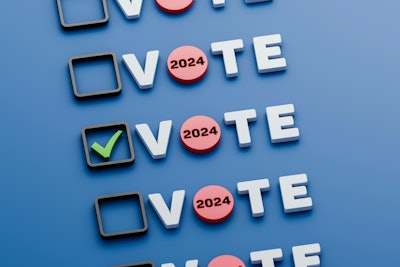
Next Tuesday, as millions of Americans tune in to election coverage, a different kind of gathering will be happening at several Aloft Hotels across the country. Instead of watching election results, visitors at these pet-friendly hotels will find themselves hanging out with puppies.
Designed to ease election night stress, Aloft’s "No Watch Puppy Parties" on Nov. 5 in major cities tap into the stress relief benefits of spending time with dogs. These free events invite guests to unplug from the tension of political punditry, cuddle puppies from local shelters, and enjoy some comforting food and drinks. Aloft has even launched a 47-minute meditation video with prompts to “paws,” stretch, and stay positive, offering guests an additional virtual outlet for stress relief.
“Everyone needs a chance to de-stress at the moment, and we decided to share some of the comfort dogs bring both virtually and in person this election season,” says Brian Jaymont, global brand leader for Aloft Hotels. “We hope this calming video and our No Watch Pawties give people a chance to relax and reset, even if it’s only for 47 minutes.”
Of course, for many event professionals, the show must go on—even when a hugely divisive presidential election is happening. It's a reality the SEMA Show, which takes place Nov. 5-8 at the Las Vegas Convention Center, knows well. Organizers of the Specialty Equipment Market Association's annual trade show, which centers on the specialty automotive parts industry, realized early on that the 2024 show's overlap with the election could cause stress among attendees.
In response, the team decided to launch the #DriveTheVote initiative, notes Karen Bailey-Chapman, SEMA’s senior vice president for public and government affairs. "Drive The Vote provides our members with information on how to vote early and provides materials for our members to share with their employees, including the vote records and positions on how candidates stand on the issues important to the industry," she explains.
During the show, SEMA's political action committee, SEMA & PRI PAC, will host a watch party on election night for donors. "The SEMA government affairs team will also host an education session on how the election outcomes will impact the industry going forward, in addition to a media briefing with industry press," Bailey-Chapman says.
The team at Kansas City, Mo.-based event production agency Platinum XP is also planning to address the election head-on at a conference next week, which will draw more than 1,000 attendees from the construction industry to San Antonio. "From the start of site sourcing and selecting this week to host the conference, we wanted to be extra cautious regarding the election and activities/speakers we planned around it," notes Whitney Butler, Platinum XP's vice president of planning and business development.
The team opted to book a comedian to entertain guests during a hosted dinner on election night—but unlike the recent headline-grabbing comedian at President Trump's New York rally, they've asked the performer not to base his content around politics or the election. "He understands the goal to keep it light and relieve some tension with comedy outside of politics," Butler says.
The next morning, the conference will host a session centered on the election results and what they mean for the construction industry. "This will include a moderator and two panelists from within the industry who will provide insight on the expected outcomes to the audience," Butler explains. "From a business standpoint, since our audience is all from the same industry and the majority of them will be affected similarly by the results, we expect this to be a very helpful and engaging discussion."
The session will include a live Q&A, Butler adds, and the moderator is being prepped on how to avoid or diffuse any inappropriate questions that might create tension in the audience.
Beyond focusing on how the election impacts attendees' work lives, it's crucial to acknowledge any stress and tension they might be feeling personally, too. Melva LaJoy, the owner of LaJoy Plans in Washington, D.C., regularly plans events for the LGBTQ+ community and other minority groups—and cautions her fellow event professionals to "focus on caring for the entire human in the event design."
For events taking place leading up to and after the election, LaJoy has been incorporating several elements, including:
- Quiet spaces for personal breaks. Having dedicated quiet zones can allow attendees to decompress from both the event and the heightened political environment, she points out. Another idea? Have inclusive areas for attendees of different faiths to have a safe space and dedicated prayer time.
- Revamped codes of conduct. It's about "affirming that differences of opinions are welcome but must be civil and collegiate," she says.
- Dedicated wellness moments. "Many of our clients this year introduced things like on-site massages at conferences to really separate from the day or what’s going on with the political climate," LaJoy notes, adding that as a ghostwriter for opening sessions, she's increasingly being asked to incorporate short wellness checks, moments of silence, or moments of recognition of the larger world. "This has been an interesting endeavor since it involves being agnostic and nonpartisan so that everyone feels respected regardless of their beliefs."
- Mental health resources. "We are seeing an influx of the inclusion of a dedicated mental health resource on site like counselors or therapists, and providing safe hours for people to talk with an expert about their feelings around the work they’re doing and the larger world," she says.
LaJoy believes that "intentional design for the whole human, inclusive of wellness and mental health considerations, is the way forward"—and encourages all event professionals to receive sensitivity and DEI training, as well as increased security training. "The better educated we as event producers are in handling situations of otherness, or high-stress events around election years, the better equipped we’ll be to ensure everyone feels safe and supported across the industry."




